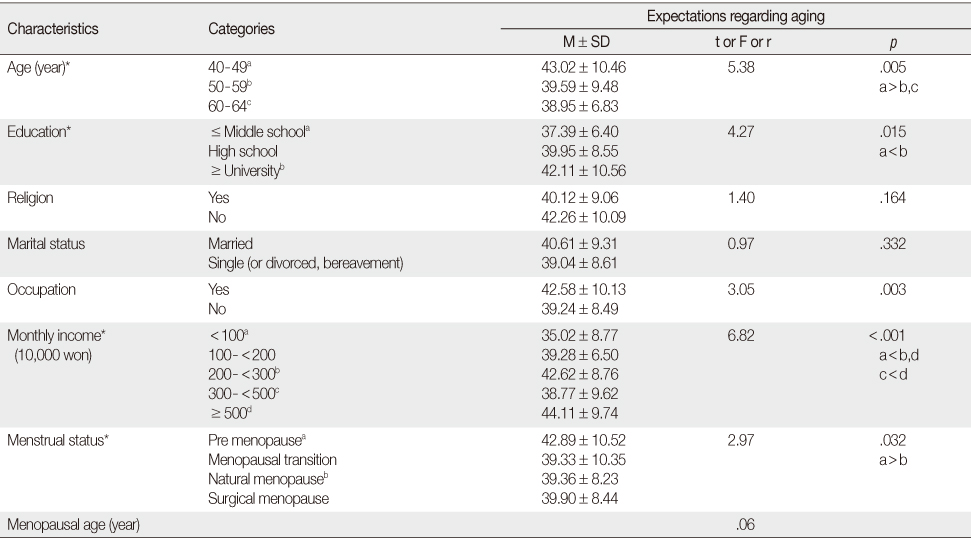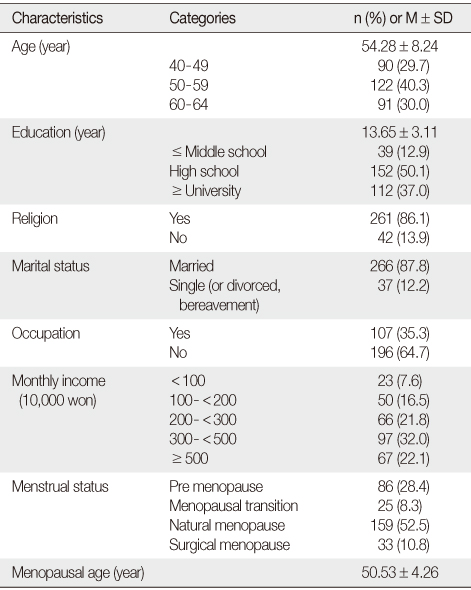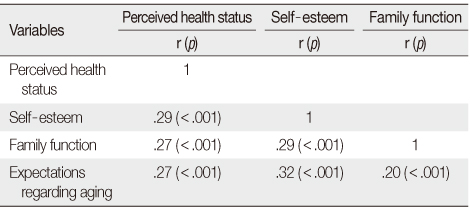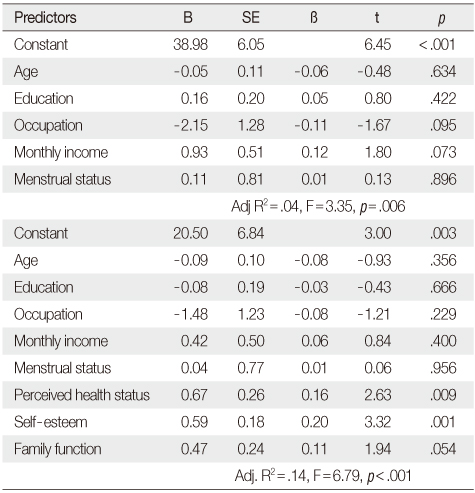Articles
- Page Path
- HOME > J Korean Acad Nurs > Volume 43(2); 2013 > Article
-
Original Article
- Effects of Perceived Health Status, Self-esteem and Family Function on Expectations Regarding Aging among Middle-aged Women
- Yoo Rim Kweon, Hae Ok Jeon
-
Journal of Korean Academy of Nursing 2013;43(2):176-184.
DOI: https://doi.org/10.4040/jkan.2013.43.2.176
Published online: April 30, 2013
1Division of Nursing Science, Ewha Womans University, Seoul, Korea.
2Department of Nursing, Cheongju University, Cheongju, Korea.
- Address reprint requests to: Kweon, Yoo Rim. Division of Nursing Science, Ewha Womans University, Helen Hall Room #110, 52, Ewhayeodae-gil, Seodaemun-gu, Seoul 120-750, Korea. Tel: +82-2-3277-2873, Fax: +82-2-3277-2850, kyr1016@gmail.com
• Received: July 21, 2012 • Accepted: October 3, 2012
© 2013 Korean Society of Nursing Science
Abstract
-
Purpose
- The purpose of this study was to investigate expectations regarding aging by middle-aged women in the community, and identify factors contributing to their expectations about aging.
-
Methods
- Participants in the survey for this study were 303 middle-aged women from community health centers and religious facilities in Seoul, Gyeonggi Province, and Chungcheongbuk Province. Data were collected from March 2 to April 17, 2012 using self-report structured questionnaires. The instruments were the Health Perceptions, Rosenberg Self-esteem Scale (RSES), Family APGAR, Expectations Regarding Aging (ERA-12). The data were analyzed using t-test, one-way ANOVA, Scheffe test, Pearson correlation coefficients and hierarchical multiple regression with IBM SPSS/WIN 20.0 program.
-
Results
- Perceived health status (β=0.16, p=.009) and self-esteem (β=0.20, p=.001) of middle-aged women were identified as significant predictors of expectations regarding aging, after adjusting for age, education, occupation, monthly income and menstrual status.
-
Conclusion
- These results suggest that nurses should make an effort to improve expectations about aging among middle-aged women. Ultimately, community health programs for middle aged women need to be developed to achieve successful aging.
- 1. An JY, An K, O'Connor L, Wexler S. Life satisfaction, self-esteem, and perceived health status among elder Korean women: Focuson living arrangements. J Transcult Nurs. 2008;19(2):151–160. http://dx.doi.org/10.1177/1043659607313070.ArticlePubMedPDF
- 2. Angus J, Reeve P. Ageism: A threat to "aging well" in the 21st century. J Appl Gerontol. 2006;25(2):137–152. http://dx.doi.org/10.1177/0733464805285745.ArticlePDF
- 3. Bak HK. A study on leisure activities, leisure life satisfaction, perceived health status and depression in the elderly. Korean J Rehabil Nurs. 2009;12(2):112–119.
- 4. Chiou CJ, Chang HY, Chen IP, Wang HH. Social support and caregiving circumstances as predictors of caregiver burden in Taiwan. Arch Gerontol Geriatr. 2009;48(3):419–424. http://dx.doi.org/10.1016/j.archger.2008.04.001.ArticlePubMed
- 5. Choi J, Ha NS. Effects of perceived health status and fatigue on family health in middle aged women. J Korean Acad Public Health Nurs. 2009;23(1):5–16.
- 6. Chong YS, Jo SA, An JS, Jeong YJ. Effect of family relations as a source of meaning of life and self-transcendence value on successful aging in Korean elders. Korean J Dev Psychol. 2012;25(1):19–41.
- 7. Faul F, Erdfelder E, Lang AG, Buchner A. G*Power 3: A flexible statistical power analysis program for the social, behavioral, and biomedical sciences. Behav Res Methods. 2007;39(2):175–191.ArticlePubMedPDF
- 8. Han J. The roles of self and society in the relationship between physical health, self-perception of aging, and depressive symptoms in later life. 2011;Ohio, USA, The Ohio State University. Unpublished doctoral dissertation.
- 9. Hong SH, Kwak IS. The effects of attitude towards aging on successful aging: The differences between single and couple aged family. J Korean Home Econ Assoc. 2011;49(4):77–91.Article
- 10. Jeong YJ, An JS. The effects of family relationships on successful aging of the elderly men. J Korean Gerontol Soc. 2010;30(2):535–550.
- 11. Kim KH, Kim HS, Park KS. The effects of family function, self-esteem, and loneliness on subjective health status in middle-aged women. J Korean Acad Adult Nurs. 2005;17(2):200–207.
- 12. Kim SA, Kim SY. The impacts of self-esteem and social support on mental health of the middle-age women. J Welf Aged. 2011;52:109–130.
- 13. Kim SH. The association between expectations regarding aging and health-promoting behaviors among Korean older adults. J Korean Acad Nurs. 2007;37(6):932–940.ArticlePDF
- 14. Kim SH. Older people's expectations regarding ageing, health-promoting behaviour and health status. J Adv Nurs. 2009;65(1):84–91. http://dx.doi.org/10.1111/j.1365-2648.2008.04841.x.ArticlePubMed
- 15. Kim SY. A study of the elderly image in Korean and Japanese television advertisements. Korean J Sociol. 2009;43(5):133–169.
- 16. Lee KJ, Chang CJ, Yoo JH, Yi YJ. Factors effecting health promoting behaviors in middle-aged women. J Korean Acad Nurs. 2005;35(3):494–502.ArticlePDF
- 17. Lee MS. Chronic diseases, depressive symptoms and the effects of social networks in Korean elderly population. Health Soc Sci. 2010;27:5–30.
- 18. Lee SS. A study on self-esteem and physical satisfaction of the elderly women. J Korean Gerontol Soc. 2009;29(2):547–562.
- 19. Marquez DX, Bustamante EE, Blissmer BJ, Prohaska TR. Health promotion for successful aging. Am J Lifestyle Med. 2009;3(1):12–19. http://dx.doi.org/10.1177/1559827608325200.ArticlePDF
- 20. Park GJ. Factors influencing the meaning of life for middle-aged women. Korean J Women Health Nurs. 2002;8(2):232–243.ArticlePDF
- 21. Rosenberg M. Conceiving the self. 1979;New York, NY, Basic Books.
- 22. Sarkisian CA, Prohaska TR, Wong MD, Hirsch S, Mangione CM. The relationship between expectations for aging and physical activity among older adults. J Gen Intern Med. 2005;20(10):911–915. http://dx.doi.org/10.1111/j.1525-1497.2005.0204.x.ArticlePubMedPMC
- 23. Sarkisian CA, Steers WN, Hays RD, Mangione CM. Development of the 12-item expectations regarding aging survey. Gerontologist. 2005;45(2):240–248.ArticlePubMed
- 24. Smilkstein G, Ashworth C, Montano D. Validity and reliability of the family APGAR as a test of family function. J Fam Pract. 1982;15(2):303–311.PubMed
- 25. Song JE, Marks NF. Parent-adult child relationships and mental health among older parents: A longitudinal U.S. national study. J Korean Gerontol Soc. 2006;26(3):581–599.
- 26. Speake DL, Cowart ME, Pellet K. Health perceptions and lifestyles of the elderly. Res Nurs Health. 1989;12(2):93–100.ArticlePubMed
- 27. Statistics Korea. 2010 life tables for Korea. 2011a;Retrieved January 16, 2012. from http://kostat.go.kr/portal/korea/kor_nw/3/index.board?bmode=read&aSeq=252533.
- 28. Statistics Korea. Population projections for Korea: 2010-2060. 2011b;Retrieved January 16, 2012. from http://kostat.go.kr/portal/korea/kor_nw/2/1/index.board?bmode=read&aSeq=252623.
- 29. Wu ZQ, Sun L, Sun YH, Zhang XJ, Tao FB, Cui GH. Correlation between loneliness and social relationship among empty nest elderly in Anhui rural area, China. Aging Ment Health. 2010;14(1):108–112. http://dx.doi.org/10.1080/13607860903228796.ArticlePubMed
- 30. Yoo JH, Chu SK, Ban KO. The relationship between the psychosocial characteristics, family function, and activities of daily living in the elderly females. J Korean Acad Public Health Nurs. 2009;23(1):40–49.
REFERENCES
Table 2Perceived Health Status, Self-esteem, Family Function and Expectations Regarding Aging of the Participants (N=303)


Table 3Differences of Expectations Regarding Aging by General Characteristics of the Participants (N=303)


Figure & Data
REFERENCES
Citations
Citations to this article as recorded by 

- Nonpharmacological Intervention Effects on Middle-Aged Women with Menopausal Symptoms: A Systematic Review and Meta-Analysis
Ji-Hyun Kim, Hea-Jin Yu
Healthcare.2025; 13(24): 3206. CrossRef - The Level of Expectations Regarding Aging Among Older Adults: A Systematic Review and Meta-analysis
Lunwei Lin, Shunqi Liao, Zhangrong Yan, Chaofan Liu, Qi Wang, Fang Wang
Journal of the American Medical Directors Association.2024; 25(3): 410. CrossRef - Digital Health Literacy and Associated Factors Among Older Adults Living Alone in South Korea: A Cross-Sectional Study
Minhwa Hwang, Gahye Kim, Seonghyeon Lee, Yeon-Hwan Park
Research in Community and Public Health Nursing.2024; 35: 389. CrossRef - Just as expected? Older adults’ aging expectations are associated with subjective cognition
Nikki L. Hill, Sakshi Bhargava, Justin Do, Emily Bratlee-Whitaker, Monique J. Brown, Renata Komalasari, Rachel Wu, Jacqueline Mogle
Aging & Mental Health.2024; : 1. CrossRef - Relationship between Fatigue, Sleep, Subjective Health Status, and Job Involvement in Shift-working Production Workers
Yeojoo Chae, Sein Ryu
Journal of Health Informatics and Statistics.2023; 48(4): 391. CrossRef - Factors influencing the health-related quality of life in Korean menopausal women: a cross-sectional study based on the theory of unpleasant symptoms
Ji-Hyun Kang, Moon-Jeong Kim
Korean Journal of Women Health Nursing.2022; 28(2): 100. CrossRef - Factors influencing quality of life in caregivers of adolescents with developmental disabilities
Joung Woo Joung
Osong Public Health and Research Perspectives.2022; 13(4): 298. CrossRef - Face Mask Usage, Knowledge and Behavior of Face Mask Usage in Older Adults Living Alone in the COVID-19 Era
A-Reum Han, Yeon-Hwan Park
Journal of Korean Academy of Nursing.2021; 51(2): 203. CrossRef - Physical Activity Level and Self-Esteem in Middle-Aged Women
Magdalena Dąbrowska-Galas, Jolanta Dąbrowska
International Journal of Environmental Research and Public Health.2021; 18(14): 7293. CrossRef - Study on health anxiety issues, health-promoting behavior, and quality of life of middle-aged women in Jeonbuk area
Sun Young Jeon, Sung Suk Chung, Jeong Ok Rho
Journal of Nutrition and Health.2020; 53(6): 613. CrossRef - Design and psychometric analysis of a climacteric adjustment questionnaire for middle-aged women
Mitra Reyhani, Ashraf Kazemi, Ziba Farajzadegan, Mahrokh Keshvari
Menopause.2020; 27(3): 333. CrossRef - The Concept of Successful Aging: A Review Article
Fatemeh Estebsari, Maryam Dastoorpoor, Zahra Rahimi Khalifehkandi, Azadeh Nouri, Davoud Mostafaei, Meimanat Hosseini, Roghayeh Esmaeili, Hamidreza Aghababaeian
Current Aging Science.2020; 13(1): 4. CrossRef - Influence of the Perception of Aging Symptoms as a Mediator and Moderator on the Relationship between Family Function and Stress in Middle-Aged Adults
Hyun-E Yeom, Kyoung Ok Ju
Korean Journal of Adult Nursing.2020; 32(2): 175. CrossRef - The Effect of Family Adaptation and Cohesion on the Well-being of Married Women: A Multiple Mediation Effect
Shuman Wu, Xue Zheng
The Journal of General Psychology.2020; 147(1): 90. CrossRef - Factors Associated with Metabolic Syndrome Among Middle-Aged Women in Their 50s: Based on National Health Screening Data
HyungSeon Kim, YeonHee Cho
International Journal of Environmental Research and Public Health.2020; 17(9): 3008. CrossRef - Health Promotion Behavior, Self-efficacy, Marital Intimacy, and Successful Aging in Middle-aged
Kyung-In Cheon, Yun Hee Shin
Journal of Korean Academy of Fundamentals of Nursing.2020; 27(3): 259. CrossRef - Experiences on Psycho-social Health Support of Middle-aged Women
Jeong-Soo KIM, Euna PARK
JOURNAL OF FISHRIES AND MARINE SCIENCES EDUCATION.2019; 31(5): 1432. CrossRef - Structural Equation Model for Sleep Quality of Female Shift Work Nurses
Ji Yeong Jeong, Mee Ock Gu
Journal of Korean Academy of Nursing.2018; 48(5): 622. CrossRef - Self-Care Compliance among Patients with Liver Cirrhosis: Focusing on Symptom Experiences, Perceived Health Status and Disease Status
Mi-Jeong Yun
Journal of Korean Academy of Fundamentals of Nursing.2018; 25(3): 165. CrossRef - Rise and fall: two sides of a coin of middle aged women’s perceptions of reproductive: a qualitative study
Mitra Reyhani, Ashraf Kazemi, Mahrokh Keshvari
Archives of Women's Mental Health.2018; 21(4): 421. CrossRef - Health-Related Effects of the Elderly Care Program
Young-Eun Kim, Seok-Won Hong
BioMed Research International.2018; 2018: 1. CrossRef - Relationships between social skills and self-esteem in nurses: a questionnaire study
Marta Elena Losa-Iglesias, Daniel López López, Rocío Rodriguez Vazquez, Ricardo Becerro de Bengoa-Vallejo
Contemporary Nurse.2017; 53(6): 681. CrossRef - The Effect of Work-Family Conflict, Fatigue and Perceived Health on the Health Promoting Behavior of Married Working Women a Rural Population
HyeaKyung Lee, EunHee Shin
Korean Journal of Stress Research.2016; 24(3): 167. CrossRef - Effects of Self-esteem, Aggression and Violence Recognition on the Academic Achievement of Adolescents
Chang Seek Lee, Hi Ran Son, Ha Young Jang
Journal of Digital Convergence.2016; 14(7): 29. CrossRef - Effects of Exercise Program for Women of Old-Old Age in Senior Citizen Halls based on Pender's Health Promotion Model
Kyoung Im Lee, Young Eun
Journal of muscle and joint health.2016; 23(2): 71. CrossRef - Influence on Health Promotion Behavior among Government-funded Research Institute's Employee according to Perceptive Health Status and Social Support
Ji Hyun Kim, Sook Kyoung Park
Korean Journal of Occupational Health Nursing.2015; 24(4): 270. CrossRef - Relationship between Expectations Regarding Aging and Physical Activity among Middle Aged Adults in Urban Areas: Based on the Pender's Health Promotion Model
Sung-Hye Cho, MoonKi Choi, JuHee Lee, Hyewon Cho
Journal of Korean Academy of Nursing.2015; 45(1): 14. CrossRef - Experience of Late–Middle-Aged Women who Reside in Small and Medium-Sized Cities in Becoming Psychologically Mature Women
Euna Park, Haeok Kim
Osong Public Health and Research Perspectives.2015; 6(3): 159. CrossRef - Testing the Validity and Reliability of Korean Version of the Expectations Regarding Aging (ERA-12) Instrument among Middle-aged and Elderly Women
Min Hee Park, Yoorim Kweon
Journal of Korean Public Health Nursing.2014; 28(3): 460. CrossRef - The influence of expectations regarding aging on health-promoting behaviors
Hyeyoung Bae, Aranbyeol Kim, Soojin Nam, Jia Youn, Haeju Youn, Gayoung Kim, Daehyae Jang, Su Hyun Kim
Journal of the Korean Data and Information Science Society.2014; 25(1): 77. CrossRef
Effects of Perceived Health Status, Self-esteem and Family Function on Expectations Regarding Aging among Middle-aged Women
Effects of Perceived Health Status, Self-esteem and Family Function on Expectations Regarding Aging among Middle-aged Women
General Characteristics of the Participants (N=303)
Perceived Health Status, Self-esteem, Family Function and Expectations Regarding Aging of the Participants (N=303)
Differences of Expectations Regarding Aging by General Characteristics of the Participants (N=303)
*Scheffe' test.
Correlations among Perceived Health Status, Self-esteem, Family Function and Expectations Regarding Aging (N=303)
Factors Influencing Expectations Regarding Aging (N=303)
Table 1
General Characteristics of the Participants (N=303)
Table 2
Perceived Health Status, Self-esteem, Family Function and Expectations Regarding Aging of the Participants (N=303)
Table 3
Differences of Expectations Regarding Aging by General Characteristics of the Participants (N=303)
*Scheffe' test.
Table 4
Correlations among Perceived Health Status, Self-esteem, Family Function and Expectations Regarding Aging (N=303)
Table 5
Factors Influencing Expectations Regarding Aging (N=303)
 KSNS
KSNS
 E-SUBMISSION
E-SUBMISSION



 Cite
Cite

